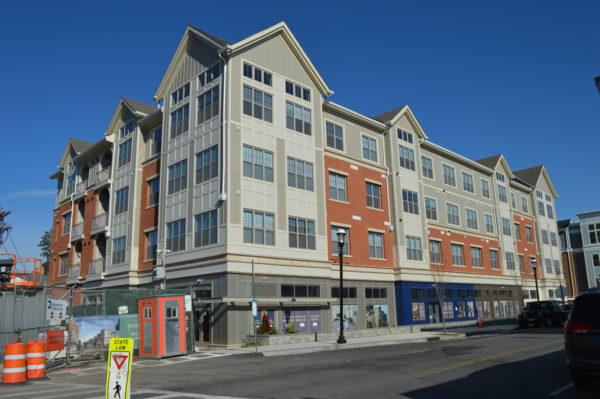A New York City company has leased space in Harrison for one of three locations it plans to use to introduce its concept for filling the gap between the office and home.
Founded in New York City in 2020, Daybase says that before the pandemic the workplace was largely defined by a single office location. It says its model “will enable a full interconnected ecosystem of work spots located close to where workers live, oriented around specific activities and employee experience.”
Daybase has leased about 6,000 square feet of space in the Avalon Harrison, AvalonBay Communities’ mixed-use development at 332 Halstead Ave. in Harrison at the Metro-North train station. The real estate property advisory firm Savills represented Daybase in negotiating the lease.

The parking garage at the Avalon Harrison complex is now open. Avalon Bay has been offering for-lease apartments as well as the retail space on the ground floor while construction at the site continues.
In addition to the Harrison location, Daybase plans to open sites in Westfield and Hoboken, New Jersey. The company said those locations were selected to provide workspace options close to where workers live.
“Daybase really came out of what was clearly a real need for a new component to hybrid work,” Daybase CEO Joel Steinhaus told the Business Journal. “In the pandemic, it became clear that the options for people were a binary choice of going into the office or working from home, What became clear to us was that people don’t want to go back to the way things were.”
Some of those involved in Daybase had worked together at the company WeWork, which provides businesses with workspaces as needed without upfront capital and lengthy leases. WeWork says it offers more than 55 million square feet of space in 151 cities.
Steinhaus said the Daybase idea is based on the concept of work no longer being tied to a specific place. Daybase seeks to create workplaces that are more than work-at-home without being a company’s main office.
A key to that is location ”” being close to a worker’s home and not as far away as would be a main office in a city’s commercial center.
“We wanted to build a product that would actually enable people to be engaged and productive during the times they weren’t going into that hub office, and during the times that home just didn’t work for what they needed to accomplish,” Steinhaus said. “We like to say that Daybase is for the times when the office is too far but home is too close. As a result that product and that experience are intended to be completely flexible, consumed completely on-demand, meant to be conveniently located. It’s really intended to be for a handful of hours a day during the days when you’re not going into that hub office.”
Steinhaus said that if an employer has a policy that requires workers to be in the office three days a week, that company’s employees could use a Daybase facility near their homes for all or part of the other two days. Daybase’s concept offers pay-as-you-go pricing as well as membership fee options.
“Daybase is in street-level retail,” Steinhaus said. “It’s integrated as part of a residential or bedroom community. It is integrated relative to where and what it is located next to as part of a daily routine. We think about child care, about fitness, about where you’re going to go and get lunch. We think about groceries. (Those are all) really good co-tenants for us because we imagine a world where on those days you’re not going into the office, you’re going to integrate your work into the rest of your life in a deeper way.”
Steinhaus said that Daybase is planning to open the first three locations early in 2022. He said that the company would expand through the use of franchising.
“Our intention is to find local partners who want to be owners and/or operators of the Daybase concept in basically every town across the country because we believe so deeply that the demand is there for this kind of product,” Steinhaus said. “We also think that what hasn’t existed in the past is a consistent enterprise-grade place to do work that you can pop into and out of and only consume on-demand when you need it. That’s what we’re trying to build here. A really scalable way of expanding physically is through franchising. It’s a tried-and-true way methodology for this.”
Steinhaus said that the company would be reaching out to landlords who have vacant retail space.
“We do think we’re a solution for landlords to monetize excess space, to monetize space that’s been empty, to monetize space that’s been in transition,” Steinhaus said. “We are very excited to partner with landlords. Our franchise community will include landlords but it won’t be exclusive to landlords.”




















